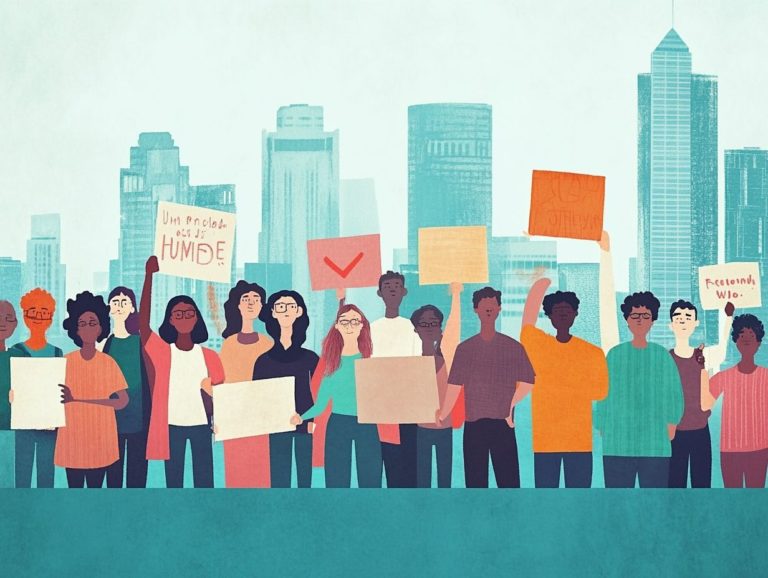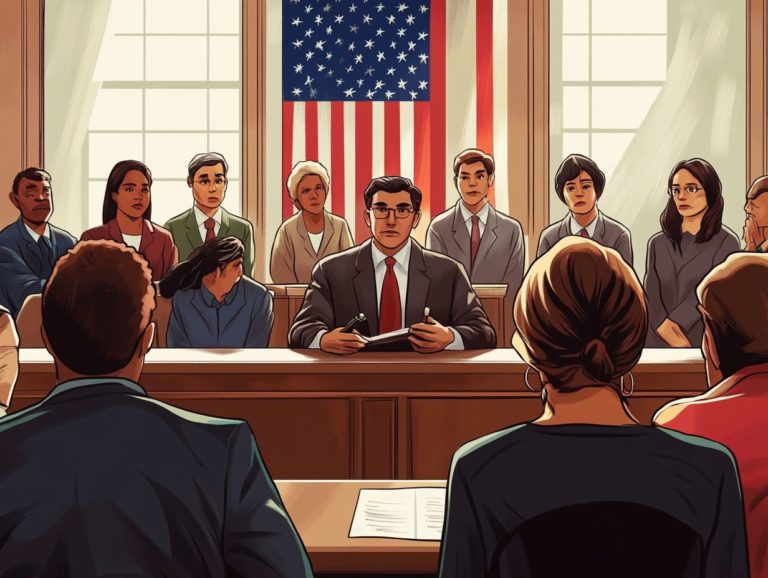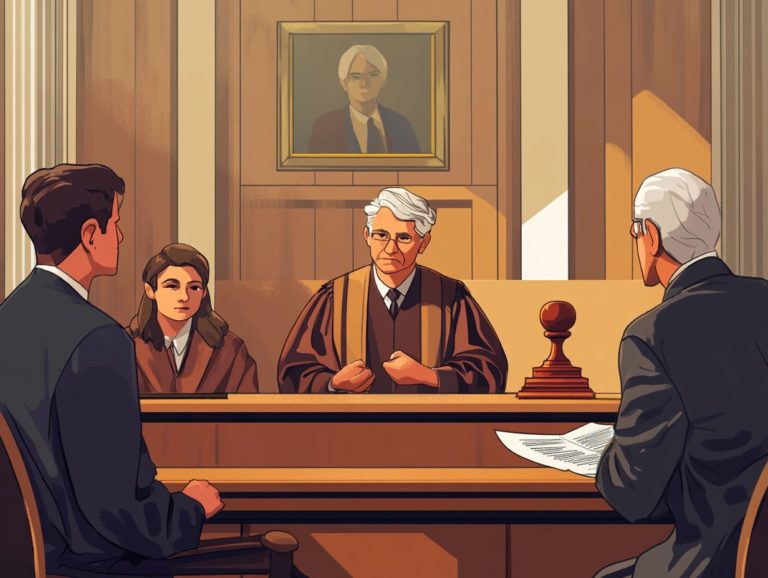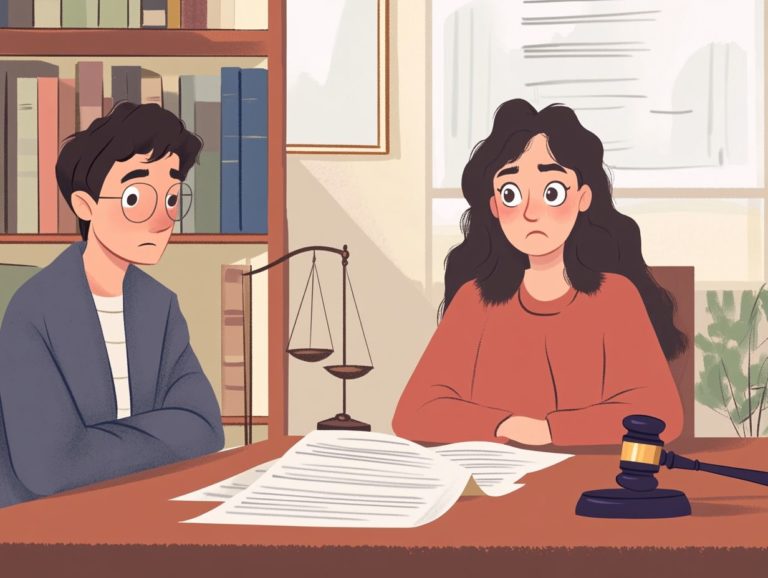10 Essential Rights for the Accused
Knowing your rights as an accused individual is crucial. This article covers ten essential rights that protect fairness and uphold due process.
You will learn about these rights, from your right to a fair trial to having legal representation.
Understanding these rights empowers you in the legal system and highlights the consequences when they are violated.
Contents
- Key Takeaways:
- 1. Right to a Fair Trial
- 2. Right to an Attorney
- 3. Right to Remain Silent
- 4. Right to a Speedy Trial
- 5. Right to Confront Witnesses
- 6. Right to Present Evidence
- 7. Right to a Public Trial
- 8. Right to an Impartial Jury
- 9. Right to Due Process
- 10. Right to Appeal
- What Are the Miranda Rights?
- Frequently Asked Questions
- What are the 10 Essential Rights for the Accused?
- Why are the 10 Essential Rights for the Accused important?
- Who is entitled to the 10 Essential Rights for the Accused?
- What are some of the 10 Essential Rights for the Accused?
- Can these rights be waived by the accused?
- What happens if the 10 Essential Rights for the Accused are violated?
Key Takeaways:
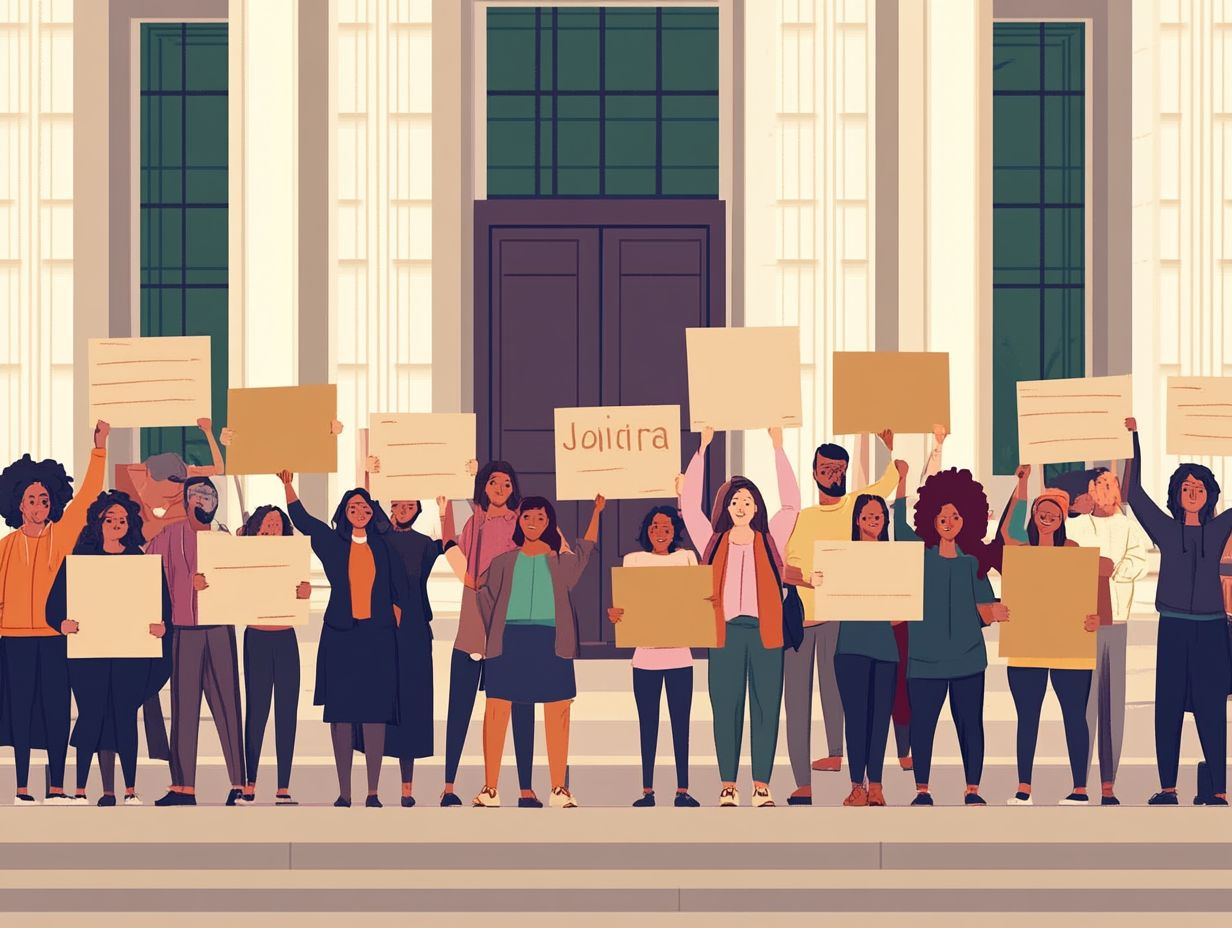
Every accused person has the right to a fair trial and to be presumed innocent until proven guilty. The right to an attorney ensures you have legal representation to defend yourself.
Your right to remain silent protects you from self-incrimination.
1. Right to a Fair Trial
The Right to a Fair Trial is a fundamental principle in the Sixth Amendment. Every accused individual deserves a fair and impartial trial.
This principle reflects the commitment to due process and equality before the law.
A fair trial includes an unbiased jury and competent legal representation, ensuring you are judged fairly by your peers.
Rules against conflicts of interest protect the impartiality of jurors, fostering fairness in trials.
2. Right to an Attorney
The Right to an Attorney guarantees access to legal representation when facing charges. This right is essential for understanding the legal process.
An attorney simplifies complex procedures, making the process easier to navigate.
Your lawyer translates legal terms into understandable language and prepares you for each step, from plea deals to trials.
Skilled representation can significantly impact trial outcomes as experienced attorneys know how to defend your rights effectively.
This right champions justice and helps create an equitable legal system.
3. Right to Remain Silent
The Right to Remain Silent protects you from self-incrimination, meaning you cannot be forced to testify against yourself.
This right is especially important when interacting with law enforcement, ensuring you are not pressured during questioning.
Miranda Rights emphasize your privacy during arrests. This protection guards against coercion, allowing you to maintain your civil liberties.
4. Right to a Speedy Trial
The Right to a Speedy Trial, as articulated in the Sixth Amendment, is designed to prevent unnecessary delays in the legal process. It ensures that you, as a defendant, can resolve your case in a timely manner while safeguarding your rights.
Judicial efficiency is crucial for keeping the legal system fair. Lengthy trials can create undue stress for you and may hinder your ability to mount an effective defense.
In landmark cases like Barker v. Wingo, the Supreme Court emphasized the importance of timely legal resolutions. It established guidelines for evaluating delays. In Strunk v. United States, the Court reaffirmed that prolonged wait times could compromise the fairness of trials.
These precedents highlight that timely justice is not just a constitutional formality; it is essential for ensuring that your rights as the accused are robustly protected.
5. Right to Confront Witnesses
The Right to Confront Witnesses, enshrined in the Sixth Amendment, grants you the essential opportunity to challenge the testimony of witnesses against you. This right is crucial for a fair trial.
By exercising this right, you enhance the credibility of the testimony presented and maintain the integrity of the judicial system. When you can cross-examine your accusers, it allows you to unearth falsehoods and assess biases, fostering transparency in court proceedings.
Legal mechanisms, including the rules of evidence, are designed to uphold this right. They allow you to scrutinize the reliability of witnesses and question any inconsistencies in their statements.
Protecting this right is vital in the pursuit of justice, reinforcing the principle that every individual deserves a fair opportunity to defend themselves against accusations.
6. Right to Present Evidence
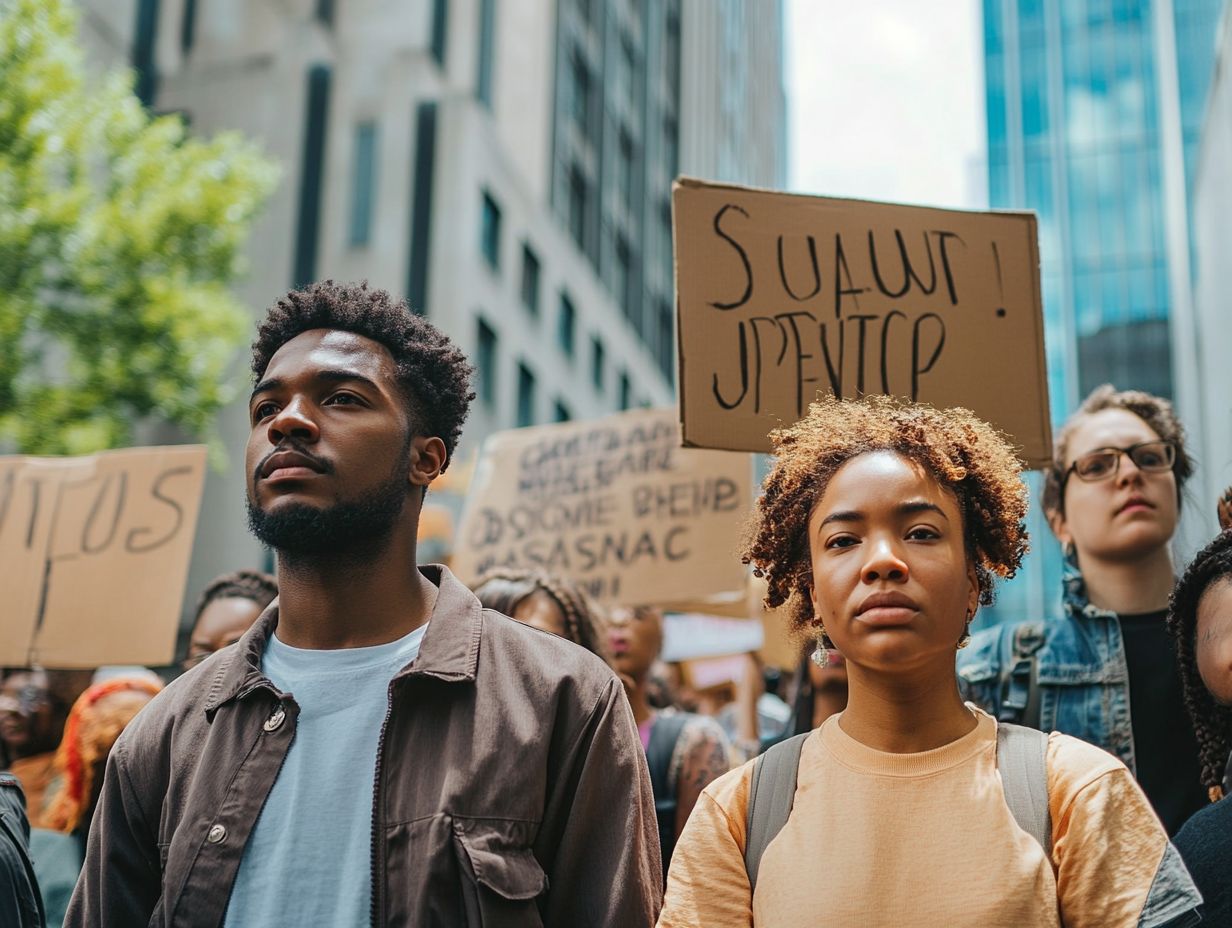
The Right to Present Evidence is a cornerstone of the Sixth Amendment, ensuring that you, as a defendant, can introduce relevant evidence in your defense. This right is essential for maintaining a fair legal process.
This powerful right allows you to challenge the prosecution’s claims by presenting various evidence, including witness testimonies, expert opinions, physical evidence, and documents.
However, different types of evidence come with specific rules regarding their admissibility. These rules can vary depending on jurisdiction and the nature of your case. For instance, hearsay a statement made outside of the court is often not allowed as evidence unless it meets certain exceptions.
Understanding these regulations is crucial, as they shape your defense strategy and impact the overall outcome of the trial. This ensures that your voice is heard within the complexities of the legal system.
7. Right to a Public Trial
The Right to a Public Trial, safeguarded by the Sixth Amendment, nurtures transparency in the judicial process. It allows you to observe court proceedings and enhances accountability in the criminal justice system.
This openness gives you the power to gain a deeper understanding of how justice is administered. It also fosters confidence in legal outcomes. Witnessing the proceedings firsthand reduces the potential for corruption and promotes fair practices among legal professionals.
Of course, there are exceptions where trials may be closed to protect sensitive information or the rights of those involved. This includes cases involving minors or national security concerns. While these instances are necessary, they highlight the balance between maintaining transparency and upholding confidentiality in the judicial process.
8. Right to an Impartial Jury
Your right to an impartial jury is vital for a fair trial! The Sixth Amendment guarantees that you, as a defendant, are judged fairly by a jury that is fair and representative of your community an essential cornerstone for upholding justice.
This principle is fundamental to our legal system. It actively works to eliminate any preconceived notions or prejudices that might sway the verdict against you. Key factors matter in selecting a jury, including demographic representation and a thorough vetting of potential jurors.
Legal provisions, such as the ability to challenge jurors for cause or utilize peremptory strikes, are designed to uphold the integrity of the proceedings. Landmark cases like ‘Batson v. Kentucky’ underscore the significance of this right, illustrating how bias in jury selection can severely compromise the fairness of legal judgments.
9. Right to Due Process
The Right to Due Process, woven into both the Fifth and Fourteenth Amendments, ensures that you receive fair treatment under the law. This guarantees that legal procedures are followed, and your civil rights are upheld.
This principle protects you from unfair actions by the government. In criminal proceedings, it assures you that if you’re accused, you must have a fair trial, access to evidence, and the opportunity to confront witnesses.
On the civil side, this right protects you in disputes involving property, contracts, or personal rights, ensuring that decisions stem from established legal standards rather than whimsical government actions.
Ultimately, the Right to Due Process cultivates a justice system that recognizes and respects your dignity, reinforcing your trust in legal institutions.
10. Right to Appeal
The Right to Appeal grants you the opportunity to challenge the legality of your conviction or the severity of your sentence, ensuring that justice is upheld and your legal rights are protected within the criminal justice system.
This essential process allows you to seek a review of your case based on grounds such as legal errors, insufficient evidence, or newly discovered information. It also serves as a critical mechanism to prevent wrongful convictions from becoming permanent fixtures in the annals of justice.
Various types of appeals exist, including:
- Direct appeals
- Post-conviction relief
- Appeals based on ineffective assistance of counsel
Each type targets specific issues in your case. By giving you the power to question the outcomes of your trial, the appeal process acts as a robust safeguard, promoting a fairer and more equitable justice system that prioritizes the accuracy and integrity of legal proceedings.
What Are the Miranda Rights?
The Miranda Rights, originating from the landmark Supreme Court case Miranda v. Arizona, safeguard your Fifth Amendment privilege against self-incrimination during police interrogations. This means you are told your rights before questioning begins.
This crucial ruling emerged in 1966, driven by escalating concerns regarding the treatment of suspects during police interrogations. Confessions were frequently extracted under duress or without adequate legal representation.
The Court’s decision sought to recalibrate the power dynamics between law enforcement and individuals in custody, fostering a more equitable justice system. By being informed of your rights including the right to remain silent and the right to legal counsel you are better equipped to navigate the intricate pathways of the legal system.
If you re not told these rights clearly, the risk of coerced confessions, wrongful convictions, and a broader erosion of trust in law enforcement becomes all too real, ultimately undermining the integrity of the criminal justice process.
What Are the Rights of the Accused During the Arrest Process?
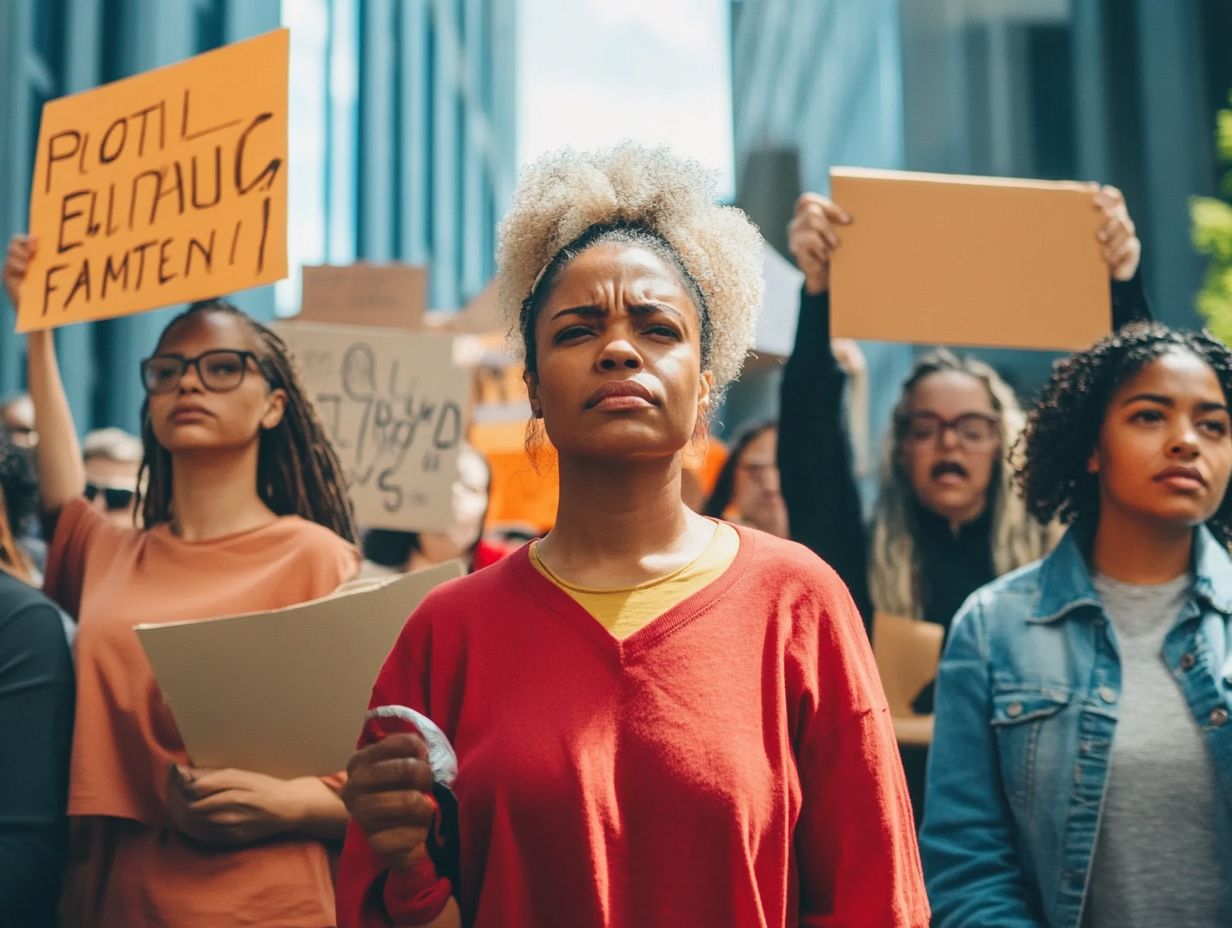
When you’re arrested, you have important rights. These include being informed of the charges, the right to remain silent, and the right to legal representation.
These rights help balance power between you and the police. Law enforcement must uphold these rights, ensuring you understand your situation and can make informed choices.
Invoking these rights helps prevent self-incrimination. It also emphasizes the importance of having legal counsel during questioning. Attorneys are essential for protecting your rights, addressing potential violations, and building a solid defense to navigate the legal system.
What Are the Rights of the Accused During the Trial Process?
During the trial, your rights include the right to a fair trial, legal representation, and the right to confront witnesses.
These rights are important for ensuring justice prevails. They guarantee a thorough examination of the facts in your case.
Your legal representation plays a critical role. It protects your interests and guides you through the complexities of legal proceedings.
The jury also plays an important role. They evaluate evidence and deliver impartial verdicts based on justice principles.
By insisting on adherence to evidentiary standards, these protections create an environment where individual liberties are respected. This ensures you have every opportunity for a fair chance in the judicial system.
What Are the Rights of the Accused After Conviction?
After conviction, you retain crucial rights. These include the ability to appeal your verdict, challenge your sentence, and receive protection against excessive bail or cruel punishment.
These rights act as a vital safety net. They ensure any errors from your trial can be closely examined.
The appeal process allows you to contest your conviction based on new evidence or mistakes made during the trial. This promotes fairness in the justice system.
You also have options for post-conviction relief, such as petitions for habeas corpus. These let you seek reconsideration of your case.
By protecting these rights, the criminal justice system works to prevent wrongful convictions and excessive penalties. This fosters a more equitable legal environment where justice can truly thrive.
How Do These Rights Protect the Accused?
Your rights, like the right to a fair trial and legal representation, are crucial safeguards within the criminal justice system. They shield you from potential abuses.
These protections uphold your dignity and reflect core principles of justice. They ensure the legal process remains impartial and fair.
Consider the landmark case of Gideon v. Wainwright, where the Supreme Court ruled that states must provide an attorney to defendants who cannot afford one. This ruling reinforces the belief that everyone deserves proper legal representation.
Moreover, protections against self-incrimination, highlighted by the Miranda rights, ensure you are not forced to testify against yourself. This cultivates a legal environment where fairness and accountability reign supreme.
What Happens When These Rights Are Violated?
When the rights of the accused are violated, significant consequences can unfold. These include wrongful convictions, appeals based on due process violations, and a noticeable erosion of public trust in the criminal justice system.
This situation goes beyond single cases, casting a long shadow over society as a whole. Knowing your legal options is essential, as being able to file for retrials or seek dismissals based on procedural errors is crucial.
Landmark cases like Miranda v. Arizona and Brady v. Maryland exemplify how violations can redefine legal standards. They underscore the need to protect constitutional rights. These precedents remind us that when justice stumbles, it can ignite a renewed push for policy reforms and greater accountability within the judicial system.
Frequently Asked Questions
What are the 10 Essential Rights for the Accused?
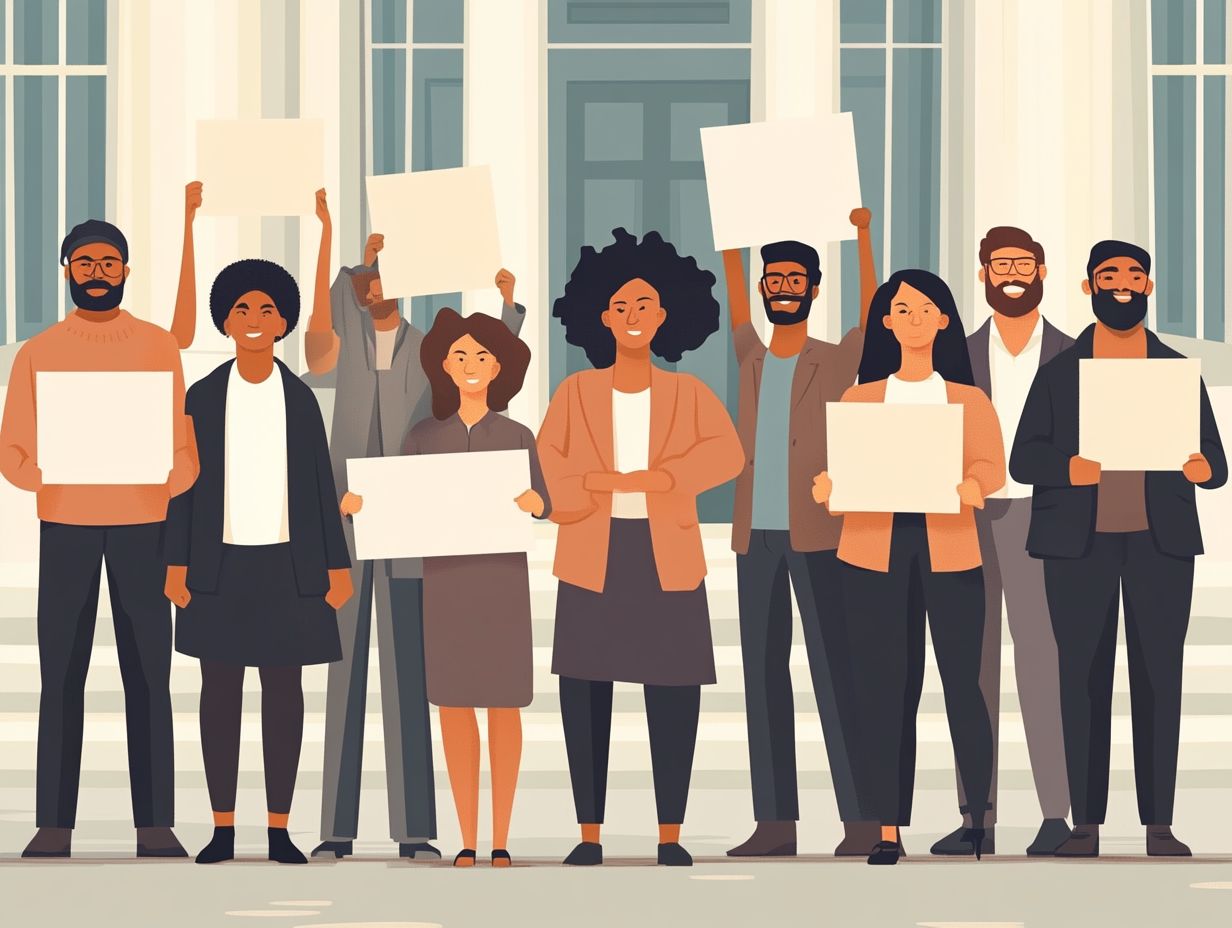
The 10 Essential Rights for the Accused are legal rights afforded to individuals accused of a crime. They protect the accused from potential violations of their constitutional rights during the criminal justice process.
Why are the 10 Essential Rights for the Accused important?
These rights are crucial they protect you! They ensure fairness and due process for individuals who have been accused of a crime and serve as a safeguard against potential abuses of power by law enforcement and the criminal justice system.
Who is entitled to the 10 Essential Rights for the Accused?
Anyone accused of a crime, regardless of guilt or innocence, is entitled to these rights. They apply to all individuals, no matter their race, ethnicity, religion, gender, or social status.
What are some of the 10 Essential Rights for the Accused?
Some of the rights include the right to a fair and speedy trial, the right to remain silent, the right to an attorney, and the right to confront witnesses against them.
Can these rights be waived by the accused?
Yes, the accused can waive these rights, but they must do so knowingly and voluntarily. This means they must fully understand the consequences of waiving their rights and make the decision on their own without any coercion or pressure from others.
What happens if the 10 Essential Rights for the Accused are violated?
If any of the rights are violated, the accused may challenge the legality of their arrest or the admissibility of evidence in court. In some cases, charges may be dismissed if it is determined that rights were violated. If your rights are violated, act swiftly to challenge any unfair treatment!
If you or someone you know is facing criminal charges, understand your rights today!

